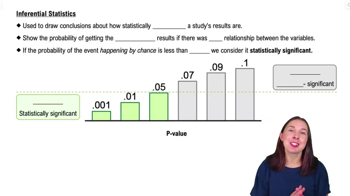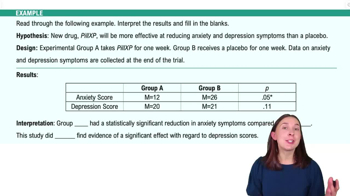Table of contents
- 1. Introduction to Psychology1h 43m
- 2. Psychology Research2h 20m
- 3. Biological Psychology2h 41m
- 4. Sensation and Perception28m
- 5. Consciousness and Sleep32m
- 6. Learning41m
- 7. Memory34m
- 8. Cognition37m
- 9. Emotion and Motivation35m
- 10. Developmental Psychology33m
- 11. Personality48m
- 12. Social Psychology41m
- 13. Stress and Health41m
- 14. Psychological Disorders44m
- 15. Treatment47m
2. Psychology Research
Evaluating Research Findings
Struggling with Psychology?
Join thousands of students who trust us to help them ace their exams!Watch the first videoMultiple Choice
According to Abraham Maslow's hierarchy, one cannot meet cognitive needs until _____ needs are met.
A
transcendence
B
self-actualization
C
esteem
D
aesthetic
 Verified step by step guidance
Verified step by step guidance1
Understand Maslow's hierarchy of needs, which is a motivational theory in psychology comprising a five-tier model of human needs, often depicted as hierarchical levels within a pyramid.
Recognize that the hierarchy is typically divided into five levels: physiological, safety, love and belonging, esteem, and self-actualization, with cognitive and aesthetic needs sometimes included as additional levels.
Identify that cognitive needs, which involve the desire to know, understand, and explore, are considered higher-level needs in Maslow's hierarchy.
Acknowledge that according to Maslow, lower-level needs must be satisfied before higher-level needs can be addressed. In this context, esteem needs, which involve self-esteem, confidence, and respect from others, must be met before cognitive needs.
Conclude that in Maslow's hierarchy, esteem needs must be fulfilled before one can focus on cognitive needs, as cognitive needs are higher in the hierarchy than esteem needs.

 6:00m
6:00mWatch next
Master Descriptive Statistics – Measures of Central Tendency with a bite sized video explanation from Hannah Gordils
Start learningRelated Videos
Related Practice















![Ethical Guidelines in Psychology [AP Psychology Unit 1 Topic 6] (1.6)](https://img.youtube.com/vi/ilq2nGO7_QA/mqdefault.jpg)





























